- Home
- Roxane Gay
Bad Feminist
Bad Feminist Read online
Contents
[INTRODUCTION]
Feminism (n.): Plural
[ME]
Feel Me. See Me. Hear Me. Reach Me.
Peculiar Benefits
Typical First Year Professor
To Scratch, Claw, or Grope Clumsily or Frantically
[GENDER & SEXUALITY]
How to Be Friends with Another Woman
Girls, Girls, Girls
I Once Was Miss America
Garish, Glorious Spectacles
Not Here to Make Friends
How We All Lose
Reaching for Catharsis: Getting Fat Right (or Wrong) and Diana Spechler’s Skinny
The Smooth Surfaces of Idyll
The Careless Language of Sexual Violence
What We Hunger For
The Illusion of Safety/The Safety of Illusion
The Spectacle of Broken Men
A Tale of Three Coming Out Stories
Beyond the Measure of Men
Some Jokes Are Funnier Than Others
Dear Young Ladies Who Love Chris Brown So Much They Would Let Him Beat Them
Blurred Lines, Indeed
The Trouble with Prince Charming, or He Who Trespassed Against Us
[RACE & ENTERTAINMENT]
The Solace of Preparing Fried Foods and Other Quaint Remembrances from 1960s Mississippi: Thoughts on The Help
Surviving Django
Beyond the Struggle Narrative
The Morality of Tyler Perry
The Last Day of a Young Black Man
When Less Is More
[POLITICS, GENDER & RACE]
The Politics of Respectability
When Twitter Does What Journalism Cannot
The Alienable Rights of Women
Holding Out for a Hero
A Tale of Two Profiles
The Racism We All Carry
Tragedy. Call. Compassion. Response.
[BACK TO ME]
Bad Feminist: Take One
Bad Feminist: Take Two
Acknowledgments
About the Author
Praise
Also by Roxane Gay
Copyright
About the Publisher
Introduction
Feminism (n.): Plural
The world changes faster than we can fathom in ways that are complicated. These bewildering changes often leave us raw. The cultural climate is shifting, particularly for women as we contend with the retrenchment of reproductive freedom, the persistence of rape culture, and the flawed if not damaging representations of women we’re consuming in music, movies, and literature.
We have a comedian asking his fans to touch women lightly on their stomachs because ignoring personal boundaries is oh so funny. We have all manner of music glorifying the degradation of women, and damnit, that music is catchy so I often find myself singing along as my very being is diminished. Singers like Robin Thicke know “we want it.” Rappers like Jay-Z use the word “bitch” like punctuation. Movies, more often than not, tell the stories of men as if men’s stories are the only stories that matter. When women are involved, they are sidekicks, the romantic interests, the afterthoughts. Rarely do women get to be the center of attention. Rarely do our stories get to matter.
How do we bring attention to these issues? How do we do so in ways that will actually be heard? How do we find the necessary language for talking about the inequalities and injustices women face, both great and small? As I’ve gotten older, feminism has answered these questions, at least in part.
Feminism is flawed, but it offers, at its best, a way to navigate this shifting cultural climate. Feminism has certainly helped me find my voice. Feminism has helped me believe my voice matters, even in this world where there are so many voices demanding to be heard.
How do we reconcile the imperfections of feminism with all the good it can do? In truth, feminism is flawed because it is a movement powered by people and people are inherently flawed. For whatever reason, we hold feminism to an unreasonable standard where the movement must be everything we want and must always make the best choices. When feminism falls short of our expectations, we decide the problem is with feminism rather than with the flawed people who act in the name of the movement.
The problem with movements is that, all too often, they are associated only with the most visible figures, the people with the biggest platforms and the loudest, most provocative voices. But feminism is not whatever philosophy is being spouted by the popular media feminist flavor of the week, at least not entirely.
Feminism, as of late, has suffered from a certain guilt by association because we conflate feminism with women who advocate feminism as part of their personal brand. When these figureheads say what we want to hear, we put them up on the Feminist Pedestal, and when they do something we don’t like, we knock them right off and then say there’s something wrong with feminism because our feminist leaders have failed us. We forget the difference between feminism and Professional Feminists.
I openly embrace the label of bad feminist. I do so because I am flawed and human. I am not terribly well versed in feminist history. I am not as well read in key feminist texts as I would like to be. I have certain . . . interests and personality traits and opinions that may not fall in line with mainstream feminism, but I am still a feminist. I cannot tell you how freeing it has been to accept this about myself.
I embrace the label of bad feminist because I am human. I am messy. I’m not trying to be an example. I am not trying to be perfect. I am not trying to say I have all the answers. I am not trying to say I’m right. I am just trying—trying to support what I believe in, trying to do some good in this world, trying to make some noise with my writing while also being myself: a woman who loves pink and likes to get freaky and sometimes dances her ass off to music she knows, she knows, is terrible for women and who sometimes plays dumb with repairmen because it’s just easier to let them feel macho than it is to stand on the moral high ground.
I am a bad feminist because I never want to be placed on a Feminist Pedestal. People who are placed on pedestals are expected to pose, perfectly. Then they get knocked off when they fuck it up. I regularly fuck it up. Consider me already knocked off.
When I was younger, I disavowed feminism with alarming frequency. I understand why women still fall over themselves to disavow feminism, to distance themselves. I disavowed feminism because when I was called a feminist, the label felt like an insult. In fact, it was generally intended as such. When I was called a feminist, during those days, my first thought was, But I willingly give blow jobs. I had it in my head that I could not both be a feminist and be sexually open. I had lots of strange things in my head during my teens and twenties.
I disavowed feminism because I had no rational understanding of the movement. I was called a feminist, and what I heard was, “You are an angry, sex-hating, man-hating victim lady person.” This caricature is how feminists have been warped by the people who fear feminism most, the same people who have the most to lose when feminism succeeds. Anytime I remember how I once disavowed feminism, I am ashamed of my ignorance. I am ashamed of my fear because mostly the disavowal was grounded in the fear that I would be ostracized, that I would be seen as a troublemaker, that I would never be accepted by the mainstream.
I get angry when women disavow feminism and shun the feminist label but say they support all the advances born of feminism because I see a disconnect that does not need to be there. I get angry but I understand and hope someday we will live in a culture where we don’t need to distance ourselves from the feminist label, where the label doesn’t make us afraid of being alone, of being too different, of wanting too much.
I try to keep my feminism simple. I know feminism is complex and evolving and flawed.
I know feminism will not and cannot fix everything. I believe in equal opportunities for women and men. I believe in women having reproductive freedom and affordable and unfettered access to the health care they need. I believe women should be paid as much as men for doing the same work. Feminism is a choice, and if a woman does not want to be a feminist, that is her right, but it is still my responsibility to fight for her rights. I believe feminism is grounded in supporting the choices of women even if we wouldn’t make certain choices for ourselves. I believe women not just in the United States but throughout the world deserve equality and freedom but know I am in no position to tell women of other cultures what that equality and freedom should look like.
I resisted feminism in my late teens and my twenties because I worried that feminism wouldn’t allow me to be the mess of a woman I knew myself to be. But then I began to learn more about feminism. I learned to separate feminism from Feminism or Feminists or the idea of an Essential Feminism—one true feminism to dominate all of womankind. It was easy to embrace feminism when I realized it was advocating for gender equality in all realms, while also making the effort to be intersectional, to consider all the other factors that influence who we are and how we move through the world. Feminism has given me peace. Feminism has given me guiding principles for how I write, how I read, how I live. I do stray from these principles, but I also know it’s okay when I do not live up to my best feminist self.
Women of color, queer women, and transgender women need to be better included in the feminist project. Women from these groups have been shamefully abandoned by Capital-F Feminism, time and again. This is a hard, painful truth. This is where a lot of people run into resisting feminism, trying to create distance between the movement and where they stand. Believe me, I understand. For years, I decided feminism wasn’t for me as a black woman, as a woman who has been queer identified at varying points in her life, because feminism has, historically, been far more invested in improving the lives of heterosexual white women to the detriment of all others.
But two wrongs do not make a right. Feminism’s failings do not mean we should eschew feminism entirely. People do terrible things all the time, but we don’t regularly disown our humanity. We disavow the terrible things. We should disavow the failures of feminism without disavowing its many successes and how far we have come.
We don’t all have to believe in the same feminism. Feminism can be pluralistic so long as we respect the different feminisms we carry with us, so long as we give enough of a damn to try to minimize the fractures among us.
Feminism will better succeed with collective effort, but feminist success can also rise out of personal conduct. I hear many young women say they can’t find well-known feminists with whom they identify. That can be disheartening, but I say, let us (try to) become the feminists we would like to see moving through the world.
When you can’t find someone to follow, you have to find a way to lead by example. In this collection of essays, I’m trying to lead, in a small, imperfect way. I am raising my voice as a bad feminist. I am taking a stand as a bad feminist. I offer insights on our culture and how we consume it. The essays in this collection also examine race in contemporary film, the limits of “diversity,” and how innovation is rarely satisfying; it is rarely enough. I call for creating new, more inclusive measures for literary excellence and take a closer look at HBO’s Girls and the phenomenon of the Fifty Shades trilogy. These essays are political and they are personal. They are, like feminism, flawed, but they come from a genuine place. I am just one woman trying to make sense of this world we live in. I’m raising my voice to show all the ways we have room to want more, to do better.
[ME]
Feel Me. See Me. Hear Me. Reach Me.
Niche dating sites are interesting. You can go to JDate or Christian Mingle or Black People Meet or any number of dating websites expressly designed for birds of a feather to flock together. If you have certain criteria, you can find people who look like you or who share your faith or who enjoy having sex in furry costumes. In the world of the Internet, no one is alone in his or her interests. When you go to these niche dating sites, you can hope you are working with a known quantity. You can hope that in love online, a lingua franca will make all things possible.
I think constantly about connection and loneliness and community and belonging, and a great deal, perhaps too much, of how my writing evidences me working through the intersections of these things. So many of us are reaching out, hoping someone out there will grab our hands and remind us we are not as alone as we fear.
I tell some of the same stories over and over because certain experiences have affected me profoundly. Sometimes, I hope that by telling these stories again and again, I will have a better understanding of how the world works.
In addition to not having done much online dating, I have never really dated anyone I have a lot in common with. I blame my astrological sign. Over time, I definitely find common ground in my relationships, but the people I tend to date are often quite different from me. A friend recently told me I only date white boys and accused me of being . . . I’m not sure what. She lives in a city and takes for granted the diversity around her. In retaliation, I told her I dated a Chinese boy in college. I told her I date the boys who ask me out. If a brotha asked me out and I was into him, I’d go out with him, happily. Brothas don’t step to me unless they’re in their seventies, and I’m not trying to date a geriatric. I also seem to have a penchant for libertarians. I seriously cannot get enough of them and their radical need for freedom from tyranny and taxation. I cannot imagine what it would be like to have a lot in common with someone I’m dating from the first encounter forward. I do not mean to suggest that I would have a lot in common with someone simply because we’re both black or both Democrats or both writers. I don’t know that there is someone in the world with whom I have a lot in common, especially not in the ways that would make sense on the kinds of websites where you enter some key characteristics and preferences and might somehow meet your match. I haven’t even tried, which I do not see as a bad thing. I love being with someone who is endlessly interesting because we are so different. Wanting to belong to people or a person is not about finding a mirror image of myself.
BET is not a network I watch regularly because I am very committed to Lifetime Movie Network and lesser cable network reality programming. Also, the shoddy programming on BET is a travesty, and considering that I have watched two episodes of WE tv’s Amsale Girls, my tolerance for shoddy programming is exceptional. It’s a shame how black people consistently have to settle for less when it comes to quality programming. It’s a shame so few options exist beyond BET. The networks offer a numbing sea of whiteness save for shows produced by Shonda Rhimes (Grey’s Anatomy, Private Practice, Scandal), who makes a deliberate effort to address race, gender, and, to a lesser extent, sexuality when she casts. Beyond that, black people—all people of color, really—only get to see themselves as lawyers and sassy friends and, of course, as The Help. Even when a new show promises to break new ground, like Lena Dunham’s Girls, an HBO show set in Brooklyn, New York, that follows the lives of four friends in their twenties, we are forced to swallow more of the same—a general erasure or ignorance of race.
Where BET is concerned, we settle for nothing at all unless it is airing reruns of Girlfriends, which is criminally underrated. It took me a long time to appreciate Girlfriends, but that show was onto something and never got the support it deserved. Sometimes, though, I feel like looking at people who look like me. Brown skin is beautiful; I like seeing different kinds of stories. The problem is that I see people on BET who look like me, but that’s where the similarities end. This is partly because I’m in my late thirties. In BET years, I am ancient. As much as I am plugged in to pop culture, there are things I don’t know about. Geography and my profession don’t help. As I began writing this essay, there was a show airing on BET called Toya. I’ve seen the name when I’ve browsed TV listings, but I�
��ve never really watched it. I eventually saw a couple of episodes and don’t even understand why this show is a show. What is the premise? I consulted Dr. Google and learned Toya is the ex-wife of Lil Wayne, but that’s it. She’s not even a backup singer or video ho, I don’t think. The threshold for fame weakens ever so rapidly.
I watched the Toya show, and there was nothing about any of it I could relate to other than caring about my family. I vaguely got the sense that Toya cares for her family and is trying to help them get on the right track, but it was fairly unclear because mostly the show involved people talking about boring things. During the show she dated someone named Memphitz (they are now married), who was looking at gorgeous diamond rings. Is he a rapper? What do these people do for a living? Lil Wayne’s child support can’t be that good. I wish BET did more to represent the full spectrum of black experiences in a balanced manner. If you watch BET, you get the sense that the only way black people succeed is through professional sports, music, or marrying/fucking/being a baby mama of someone who is involved with professional sports or music.
Once in a while, I would love to see an example of black success that involves other professional venues. On most television shows, white characters provide viewers with a veritable panoply of options for “What I Want to Be When I Grow Up.” There are exceptions, certainly. Laurence Fishburne played the lead on CSI for a season or two. Back in the day, Blair Underwood played a lawyer on L.A. Law. There are the aforementioned Shonda Rhimes–helmed shows. I suppose the thinking is that a person of color as a lawyer or doctor or writer or, hell, a jazz musician or school teacher or professor or postal worker or waitress wouldn’t be as interesting for the kids because the allure of current offerings is undeniable. And yet. At some point, we have to stop selling every black child in this country the idea that he or she only needs to hold a ball or a microphone to achieve something. Bill Cosby is kind of crazy these days, but he knows what he’s talking about, and he’s kind of crazy because he’s been fighting this fight for his whole damn life. BET frustrates me because it is a painful reminder that you can have something and nothing in common with people at the same time. I enjoy difference, but once in a while, I do want to catch a glimpse of myself in others.

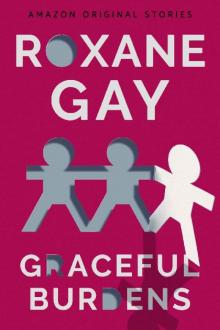 Graceful Burdens (Out of Line collection)
Graceful Burdens (Out of Line collection)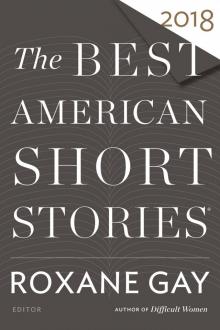 The Best American Short Stories 2018
The Best American Short Stories 2018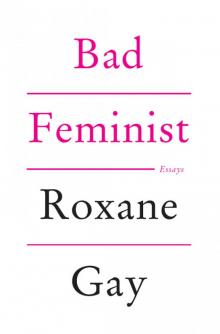 Bad Feminist
Bad Feminist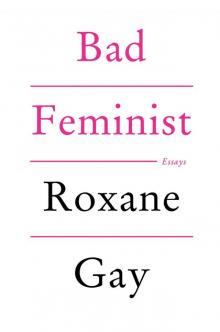 Bad Feminist: Essays
Bad Feminist: Essays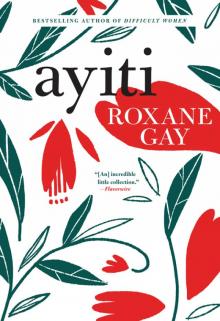 Ayiti
Ayiti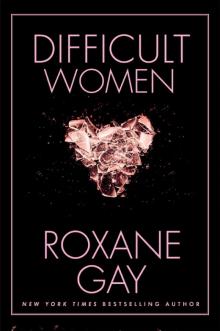 Difficult Women
Difficult Women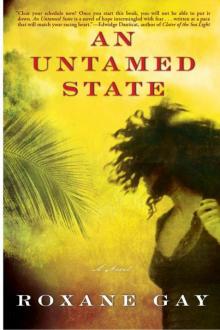 An Untamed State
An Untamed State Hunger
Hunger